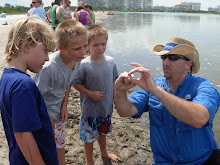As the fishing action heats up this summer, so inevitably do
temperatures, which can spell trouble for an angler if he/she isn’t careful. Fish are highly perishable, and the methods by
which anglers handle their catch from the time it is hooked until it is cooked can
impact the quality of their meal.
Once a fish dies, irreversible
spoilage begins. Enzymes and bacteria are responsible for this process. Enzymes
that normally regulate a fish’s metabolism are left unchecked and start breaking
down body cells. Fish caught while feeding may experience quicker rates of
spoilage because digestive enzymes will already be active. A softening of flesh around the gut is often
an indication of this process as enzymes quickly digest these tissues.
Bacterial growth in the body will accelerate as the fish
decomposes. Fish may also become more susceptible to bacteria from the
environment as the fish’s natural defenses are broken down. Exposure to the sun
and Florida
While it is impossible to completely prevent spoilage, anglers
can reduce this process by properly chilling their catch. This also reduces
health risks associated with warmer temperatures.
One of the most recommended chilling methods for
recreational anglers is the use of a brine slush-ice mixture. This is
accomplished by combining at least two parts ice to one part clean seawater in
an insulated cooler. Fish will chill four to five times quicker in slush ice
because it will be surrounded by 32°F slush water.
To maximize the chilling process, seafood specialists
recommend using at least one pound of ice per pound of fish. Cover the bottom
of a cooler with several inches of ice and then surround the entire fish with
another layer of ice. When deciding on
how much ice to bring, anglers should also take into account the length of
their trip, the surrounding air and water temperature, and if possible, the
type and size of fish being targeted. Crushed
or flaked ice is recommended because of the greater amount of surface area in
contact with the fish, which will result in quicker chilling rates. Larger
pieces can tear or bruise the skin more easily, but is better than no ice at
all.
As the ice melts, water will help wash bacteria away from
the surface of the fish. Water should be drained periodically to help remove accumulated
bacteria. Continue to add ice as needed to maintain the appropriate slush mix.
Bleeding and gutting a fish will also enhance the quality of
fish destined for your plate. Bleeding a fish will improve muscle appearance
and flavor, and can reduce the cooling time once a fish is put on ice. Gutting a fish helps to remove sources of
bacteria and enzymes that can increase spoilage rates. It will also reduce chilling
time because a significant amount of body weight is removed. Keep the entrails intact to avoid
contamination with other parts of the body. Knives and cutting surfaces should
be clean to minimize further contamination. Once the fish is gutted, rinse the
cavity with clean water to remove any excess blood, slime or viscera and pack
it in the ice. Keep in mind that
legally, fish must be landed whole with head and tail intact.





Hi,
ReplyDeleteRecently I came across some great articles on your site. The other day, I was discussing (http://collierseagrant.blogspot.in/2012/06/dont-let-your-catch-spoil-day.html ) with my colleagues and they suggested I submit an article of my own. Your site is just perfect for what I have written! Would it be ok to submit the article? It is free of charge, of course!
Let me know what you think
Contact me at john26anderson@gmail.com
Regards,
John Anderson